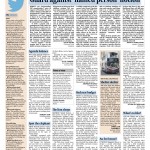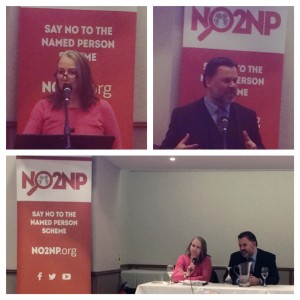Blog
Keeping you up to date on the progress of the Named Person scheme and the NO2NP campaign.
GPs, housing officers and charities recruited to spy on families
Posted 8 years ago Remember that Named Person implementation board that was disbanded after the police rep questioned the Named Person scheme?
Remember that Named Person implementation board that was disbanded after the police rep questioned the Named Person scheme?
Home Education Forums waded through its minutes and here are five interesting things the board had to say about your privacy:
1. Housing officers should be telling Named Persons what they see in your home.
March 2012: “importance of linking in with housing personnel was also raised, as they are often the only ones going into a house”.
February 2013: “working with Housing was very productive as they had access to information and were supportive”.
2. Voluntary groups should be recruited to help Named Persons keep track of you.
June 2012: “there may be difficulties sharing information where children cross geographical boundaries. Local solutions may not factor in third sector access for inclusion in secure information sharing systems. …The board agreed that it gave its strongest encouragement that information sharing across boundaries and with the third sector should be included in local solutions.”
3. GPs don’t like being told to breach your patient confidentiality, but the Minister just regards that as a barrier to be broken.
February 2013: “issues with GPs, due to their structures and contracts… The Minister was keen that more work with GPs was done to break the barriers”.
April 2013:“there were a lot of messages from GPs… the Royal College had the final version of the statement but that they were still considering it within Scotland. The British Medical Association was still to consult with the General Medical Council. The Minister added that we needed to figure out how to manage anxieties from some of the professions.”
4. This is not about ‘child protection’. Your information can be shared without your consent even if it is merely about a “potential risk to wellbeing”. (Remember, wellbeing means happiness.)
September 2012: “difficulties in sharing information where a concern is below the level of a child protection concern. The board agreed that engagement with the Scottish Information Commissioner should take place in order to open a discussion on the extent to which information could be shared without consent if there was a concern that there was a risk or potential risk to wellbeing.”
November 2012: “ICO [Information Commissioner’s Office] stressed neither the Act or ICO – should be seen as a barrier. Information about children should be shared appropriately when justified”.
5. They know you don’t like what they are doing – but they are going to do it anyway.
November 2012: “There was a suggestion that we need to do more to ‘take the community with us’. Families, carers and children were not, it was said, switched on to GIRFEC…it had been a conscious decision to focus first on embedding GIRFEC in the professional practice of all stakeholder delivery bodies, before raising awareness in the general public”.
February 2013: “…the issues around sharing information without consent. A joint statement has been agreed with the Information Commissioner’s Office which should help clarify situations where a child was on a pathway to risk to wellbeing as well as significant risk of harm. The statement should free up the way practitioners share information under existing law. However there were concerns on how best to disseminate the message in a way that did not produce an adverse reaction for stakeholders.”
Children’s Panel Member says Named Person is “Clumsy and overblown”
Posted 9 years agoA Children’s Panel Member in Falkirk, which has been operating the ‘Getting It Right For Every Child’ (GIRFEC) approach for some time, has written to The Scotsman criticising the Named Person plans.
“My objections are as stated by many others, in the area of unnecessary state intervention into family life”, wrote David Donaldson.
He continued: “On a practical note, most government department’s administration is slow moving and woefully inefficient, with the obvious recent example of the police being unable to indicate numbers of stop and searches and blaming it on a “clunky’ computer.
“What chance, therefore, is there of an effective system of monitoring every child in Scotland up to the age of 18?
Donaldson raised concern that families in crisis, which “require a speedy, effective response from the relevant services”, will fall into the “black hole” of Government administration.
He said: “At present, Children’s Hearings receive reports from and attendance by Social Services, health visitors, and teachers, along with many other organisations such as Barnardo’s and Spark of Genius, as well as local ¬authority intensive crisis services.
“Many of these people who will be ‘Named Persons’ are already actively involved with families and doing excellent work. Families in crisis require a speedy, effective response from the relevant services but there is the real likelihood they will fall into the “black hole” that will be Government administration.
He asserted: “We do not need GIRFEC but what we do need is ‘Get It Right For Every Vulnerable Child’ and there are, unfortunately, still too many of them.
“If the Scottish Government has £40 million to invest it would be much better spent in bolstering the existing services which are often overstretched and swimming against the tide”.
Source: Scotsman Letters: Guard against ‘named person’ notion, The Scotsman, 06 July 2015
NO2NP Roadshow: Elgin highlights
Posted 9 years agoThe campaign saw strong support in Elgin last night as concerned parents and individuals, with some traveling quite a distance, turned out for the latest NO2NP Roadshow.
Nigel Kenny of The Christian Institute explained that the campaign was made up of a broad coalition of organisations and individuals from academia, charities, education, medicine, politics and social work. He said all those involved have a shared concern for the importance and autonomy of the family in raising the next generation.
Videos were shown, the first explaining the background to the campaign, and the second from First Minister’s Questions last week, when NO2NP supporter Liz Smith MSP challenged Nicola Sturgeon over Clan (Community Law Advice Network) Childlaw’s concerns about data sharing.
Lesley Scott from Tymes Trust then spoke about the blueprint for every child’s life that has been planned under the GIRFEC (Getting It Right For Every Child) model, including the Wellbeing Wheel, the My World Triangle and the Resilience Matrix. She pointed out that Edinburgh University had identified no fewer than 304 outcomes that could arise from the SHANARRI “wellbeing” indicators.
Nigel finished off the talks with an update on the judicial review appeal (due to be heard in Edinburgh on 3rd and 4th June) and some tips on how people can get involved with the campaign.
There was a lively and extended Q&A at the end, where people expressed their deep concerns about the negative impact that the scheme will have on families, schools and society at large.
The NO2NP Roadshow will be stopping off at Falkirk next on Wednesday 27th May, when we’ll be at the Best Western Park Hotel in Camelon Road at 7.30pm. Hope to see you there if you live in and around the area!
NO2NP Roadshow: Aberdeen highlights
Posted 9 years agoThe latest NO2NP Roadshow event was held in the Aberdeen Arts Centre on Monday (11th May), where one local woman’s run in with an emanation of the Named Person scheme at her daughter’s school was raised during Q&A as a matter of concern. Even more concern was expressed when it was revealed that a GP would be obliged to share confidential patient details about, for example, a mother’s struggle with depression with her child’s Named Person.
After a video was shown about the judicial review in the Court of Session, Abertay University sociology lecturer Dr Stuart Waiton spoke about the disjuncture between the people and the powerful and how, over the past century, children were no longer being seen in the context of their families and government was increasingly seeing its role as one of “risk management”.
Lesley Scott of Tymes Trust then made reference to the quote in a recent newspaper article by Acting Minister for Children and Young People that the Named Person legislation “is about making sure that we are doing everything in our power to protect vulnerable children.” Lesley then pointed out that the word ‘vulnerable’ does not appear anywhere in the legislation or in the draft statutory guidance. Instead, she said “this legislation is about measuring the wellbeing of each and every child.”
Some practical points on how people can be involved in helping the NO2NP campaign were then shared by Nigel Kenny of The Christian Institute, before a lively Q&A, always one of the high points of these Roadshows.
Our next event is in Elgin this coming Monday (18th May) at the Laighmoray Hotel, Maisondieu Road, Elgin, IV30 1QR at 7.30pm – please do come along and find out more about the campaign.
Dr Stuart Waiton: Named Person law ‘degrades the very meaning of privacy’
Posted 10 years agoBy Dr Stuart Waiton, a sociology lecturer at Abertay University, writing in a personal capacity.
Here he expresses his deep concerns about the named person provisions of the Children and Young People (Scotland) Act.
About 10 years ago, I decided to write a dystopian novel about a future where the idea of privacy had completely collapsed, where each child born was given a live-in “support worker” who helped the parent manage the difficult child while ensuring the child was safe from the parent’s problematic behaviour. The very idea of private intimacy and personal responsibility no longer existed in this futuristic dystopia, where safety had become the only principle and all relationships were now mediated through a state-paid professional.
Of course the book was never written and now, following the passing of the new Children and Young People (Scotland) Act, it has become almost obsolete because it is no longer a futuristic fantasy that every child will have their own “support worker” assigned at birth. It is to become a lived reality.
The new act will mean that, from birth, each child in Scotland will have a specific state-appointed professional, a ‘named person’, to oversee their interests, and in particular, to oversee their safety. Initially this named person is likely to be a health visitor or midwife, the role later being taken over by school teachers who will have the “duty” and responsibility to act as the child’s guardian. The regulation of data-sharing between professionals is also to be loosened and the guardians will have new legal authority to access data from the police, local authority council, NHS files and even, potentially, information accessed from Young Scot (leisure) Cards.
The children’s minister, Aileen Campbell, has been dismissive of those parents groups who have raised concerns about “state snoops”, or who, like the various Christian groups opposed to the idea, have described the new law as an “attack on the family”. For Campbell, the new powers and duties being given to the state guardians are simply another service to both help families in trouble and also to further ensure that children are protected in society. Indeed, Aileen Campbell at times appears to be nonplussed by her critics, incapable of seeing why her caring approach is not simply celebrated. The idea of state snoops undermining the family, she argues, is simply “misunderstandings” and “misrepresentations” of the new law. Somewhat comically, when quizzed about the state’s overbearing intrusion into the home represented by the new act, Aileen Campbell replied, without a hint of irony, that “we recognise that parents also have a role” in looking after their children. Also?
However, given the increasing way in which all children are today being categorised as ‘vulnerable’, where all professionals are being educated to put child safety at the top of their agenda and when ‘early intervention’ is promoted as the only rational approach to solving social problems, there is a serious risk that the relationship between the ‘named person’ and parents will become one predicated upon suspicion. Given that the trigger for intervention into a child’s life is also being down-graded to concerns about ‘well-being’, rather than when a child is at serious risk of harm, the potential for unnecessary and potentially destructive state intrusion into family life is significant.
The Scottish government appears to be blind to the potential this new act has for transforming the relationship between parents and the state, and for degrading the very meaning of privacy. Likewise the potential this approach has for sullying relationships between teachers (who will be the main state ‘named person’) and parents, is ignored. Tragically, the danger is also that by incorporating every single child into the child safety rubric, the very few children who need state intervention in their lives will become lost. As one concerned parent has noted, when you are looking for a needle in a haystack, why make the haystack bigger?







